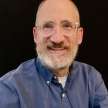Writing My Way to Sleep
Morning Pages and Better Sleep

"You know writing and sleep are associated with mental and physical health. So why not combine them and multiply the benefits?" asked my friend Ned, who often speaks as if he's an authority on any given subject.
"That sounds plausible, but I'm not really looking for any new year's resolutions right now," I replied.
"Well, there's plenty of research about the benefits of better sleep. You'll have less fatigue and a better mood. Look online if you don't trust me," explained Ned.
"Sure, good sleep results in lots of benefits, that's pretty much common sense, but I don't think I've heard the same about writing," I said.
"I'm not making this up. Search for 'expressive writing and mental health' and you'll see there's tons of research on it," Ned shot back.
"OK Ned, you win. I'll check it out,” and I was off to my next meeting.
Morning Pages
It wasn't just Ned's question that to led to my 2021 experiment. Several successful writers also inspired me. In her best-selling psychology and self-help book, The Artist's Way, Julia Cameron makes the case for writing “morning pages” as a way to discover and recover your creative self. She recommends three handwritten pages first thing every morning to capture “meanderings" where “nothing is too petty, too silly, too stupid or too weird to be included.”
Publishers initially rejected The Artist’s Way, but Cameron persisted by self-publishing and building a record of sales. Eventually it found a home on The Top 100 Best Self-Help Books of All Time.
Cameron, who is now 73 and lives in Santa Fe, New Mexico, has written 14 other non-fiction books, nine plays, four books of poetry, and two books of fiction. Morning pages, word processed ones in my case, have been an occasional part of my morning routine for at least a decade, but it's been an on-again-off-again struggle for consistency.
Five Pages Per Day
Another influence is the late author Larry McMurtry. As a prolific producer of fiction and screenplays, McMurtry wrote the Pulitzer Prize-winning novel Lonesome Dove. He also wrote The Last Picture Show and then adapted the novel into a screenplay with the late Peter Bogdanovich. With Diana Osana, he co-wrote the screenplay for Brokeback Mountain based on the short story by Annie Proulx. The movie won three Oscars including Best Adapted Screenplay.
McMurtry’s writing output was staggering. He wrote 38 novels, more than two dozen screenplays and teleplays, three memoirs and hundreds of book reviews. He described his disciplined approach in his 2008 memoir, Books. “My method of writing was, from the first, to get up early and dash off five pages of narrative…I write every day, ignoring holidays and weekends.”
McMurtry died at age 84 in his hometown of Archer City, Texas on March 25, 2021. As I read the tributes that followed, I thought that if he could write virtually every morning throughout his adult life, maybe I could give it a try as see how well it might work for me.
A Toxic Mix
Ernest Hemingway also influenced my planning. The Nobel and Pulitzer prize-winning author of The Old Man and the Sea was profiled in the 2021 PBS documentary series by Ken Burns and Lynn Novick.
As a young man Hemingway developed a practice of getting up early to write. For a time, he followed that with swimming half mile at noon in his Havana swimming pool. He also combined those life affirming habits with decades of heavy drinking in the afternoons and evenings.
His eventual alcoholism, plus traumatic brain injuries, clinical depression and family dynamics, led to suicide at age 61. His lifetime output including fiction and non-fiction, spans 19 volumes, but only nine books were published during his lifetime. There’s much to admire about Hemingway and plenty to sidestep.
Sleep Science
Some sleep advice also came from a writer, the columnist and author Arianna Huffington. In her book The Sleep Revolution, she tells of her own crash from overwork and sleep deprivation. Huffington, now age 71, also cites research on how sleep is vital to remembering, learning, brain development and rejuvenation, as well as its impact on mood, creativity and relationships. She says getting better sleep isn't like turning on a switch, but is more of skill that you build upon through practice over time.
With insights from Huffington, Hemingway, McMurtry and Cameron on paths forward and what to avoid, I sought to find the right mix for my own optimum rest and writing.
Round One
My first try started July 4, 2021. I sought to be at my writing desk by 6:00 a.m., write five double-spaced manuscript pages, then get on with my day, and at the end of it, get to bed no later than 10:00 p.m. I wondered what would it be like to be so tired before 10:00 that your two urgent goals are to just brush your teeth and get in bed? What would it be like to be so ready for sleep and so confident of getting it that your last words of the night are, “Siri, set an alarm for 5:50 a.m.?” and moments later your bed has almost magically transported you to planet sleep.
I don’t have to guess about the answers to these questions. By late October I had slept many a refreshing night and written a 500 page manuscript totaling 144,426 words. Then I crashed.
As I prepared for a weeklong conference prior to Thanksgiving, I found myself ignoring my self-imposed bedtime and staying up later and later to finish last minute scheduling of conference interviews.
My resulting weariness made getting up to write feel like an impossible chore. I was no longer motivated to spring out bed and start writing. What started as one day off, stretched into a week, and then several weeks. When I eventually resumed writing in late December, I thought there’s got to be a more sustainable way.
My 2022 Resolution
That's how my 2022 sleep and writing resolution evolved. This year, when I feel fatigue—and I know I will—I'm surrendering to it with more sleep not less writing. I'm also practicing other sleep-friendly habits like regular exercise well before bedtime, less screen time after dinner and more evening activities like relaxing with an audiobook or music.
Round two started January 1. I’m only 18 days into the New Year, but this morning I hit 95 pages and 24,789 words. Most nights I’m in bed by 9:45 and I'm often asleep before 10:00. I'm also watching less video, listening to more audiobooks (including all of the authors mentioned above) and exploring more music, ranging from Beethoven and Chopin to Ed Sheeran and Billie Eilish.
Ned Gets the Last Word
While Ned is my good friend and sometimes annoying companion, he is also fictional. As such he never hesitates to jump into my morning pages. Ned, and a few other characters, keep me grounded in the kind of emotional expression that keeps my writing both therapeutic and playful. A recent encounter included this exchange:
Ned: You were just plain lazy yesterday. You wrote your five morning pages but that's about all you did. No exercise. No meditation. Do you really think you can get away with this?
Me: It's true. I wrote and then I took it easy. It was a low key day. I gave myself some time to recover from a long, cold week.
Ned: You gave yourself way too much time.
Me: Ned, thanks for your candor. Your perspectives are always welcome. You know that, don’t you?
Ned: You, my friend, are sometimes full of it.
Me: You know old that saying about holding your friends close, but your enemies even closer?
Ned: What about it?
Me: I’m just glad that we’re growing closer.
Ned: So, I'm your enemy now?
Me: Of course not. I'm just giving you a taste of your own medicine.
Ned: No thank you, doctor. I don't require any meds from you!
Me: Speaking of pharmaceuticals and avoiding them, your recommendations on writing and sleep are definitely good medicine for me.
Ned: How's that going?
Me: Some days are better than others, but so far so good. In fact, you've been helpful enough that I’m going to write a story about how you’ve made an impact.
Ned: I’ll believe it when I see it.
Me: Don't hold your breath.
Ned: Oh, I'll be breathing easy. And I'll expect a report on your progress or lack of it first thing tomorrow morning.
About the Creator
Rich Finlinson
Speaker, swimmer, writer and grandpa






Comments
There are no comments for this story
Be the first to respond and start the conversation.